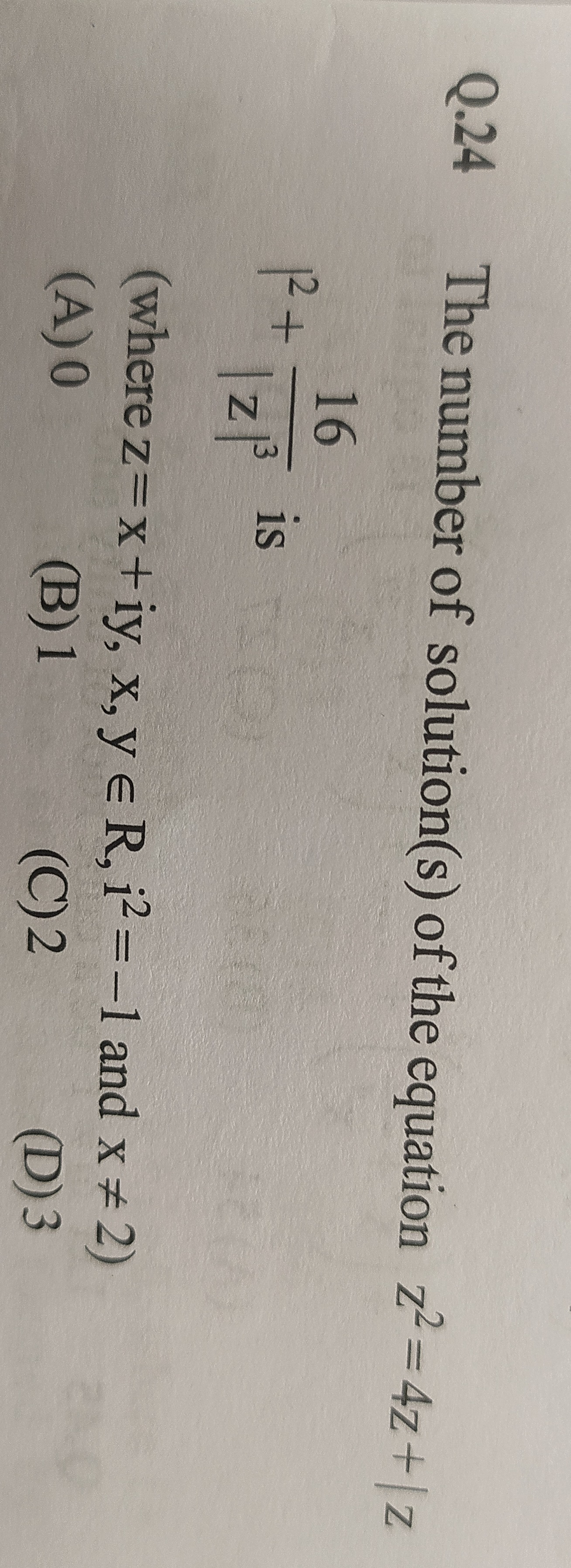Question
Question: The number of solution(s) of the equation $z^2 = 4z + |z|$ $|2 + \frac{16}{|z|^3}|$ is (where z=x+...
The number of solution(s) of the equation z2=4z+∣z∣
∣2+∣z∣316∣ is
(where z=x+iy, x,y ∈ R, i2=−1 and x = 2)

0
1
2
3
2
Solution
We are to solve for complex numbers z=reiθ (with r=∣z∣>0) satisfying
z2=4z+∣z∣2+∣z∣316.Since
2+∣z∣316=2+r316(because r>0),the equation becomes
z2=4z+r(2+r316).Writing z=reiθ, note that
z2=r2e2iθand4z=4reiθ.Thus, dividing the entire equation by r (since r=0) we obtain
re2iθ=4eiθ+(2+r316).Write this in rectangular form:
r(cos2θ+isin2θ)=4(cosθ+isinθ)+(2+r316).Equate the imaginary parts:
rsin2θ=4sinθ.Since
sin2θ=2sinθcosθ,for sinθ=0 we have
2rsinθcosθ=4sinθ⟹rcosθ=2.But then the real parts become (with cos2θ=2cos2θ−1):
r(2cos2θ−1)=4cosθ+(2+r316).Substituting cosθ=r2 (from rcosθ=2) we get:
r(2r24−1)=r8+2+r316.Simplifying gives
r8−r=r8+2+r316,or
−r=2+r316.Multiplying by r3>0 yields
−r4−2r3−16=0⟹r4+2r3+16=0,which for r>0 has no solution. Hence, the only possibility is when
sinθ=0.Thus, let θ=0 or θ=π.
Case 1: θ=0
Then z=r (a positive real number). The equation becomes:
Multiplying by r3 gives
r4−6r3−16=0.For r>0 this equation has exactly one positive real root (found via the Intermediate Value Theorem), and x=2 is automatically satisfied since r>6 approximately.
Case 2: θ=π
Then z=−r (with r>0). With e2iπ=1 the equation becomes:
or
r=−2+r316.Rearrange:
r+2=r316⟹r4+2r3−16=0.Again, for r>0 this has exactly one positive real root (which can be shown through sign change analysis).
Thus, we obtain one valid solution for each of the angles θ=0 and θ=π.
Conclusion: There are 2 solutions.
